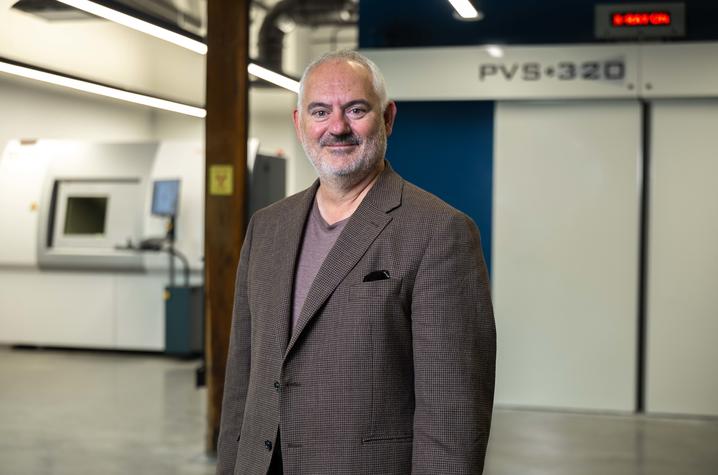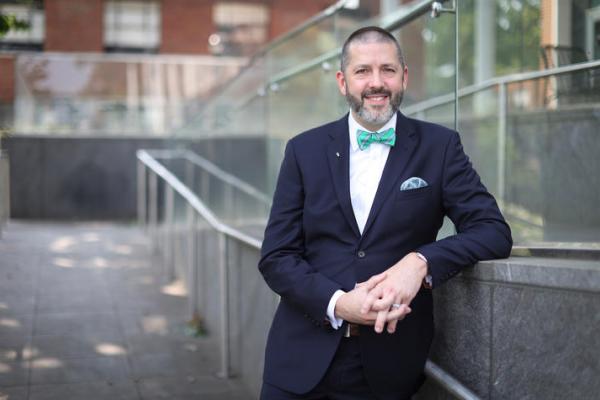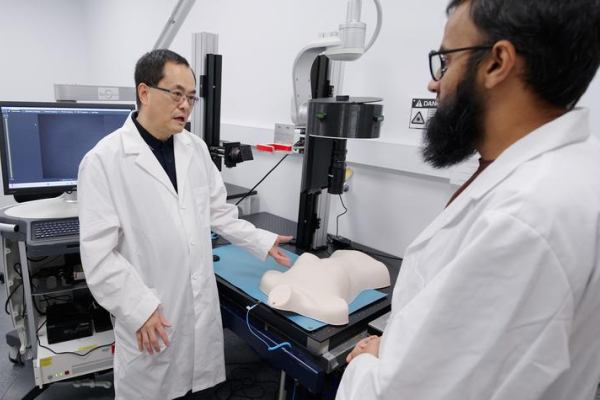Bridging past and future: UK’s Brent Seales to lead national AI-humanities initiative at Schmidt Sciences

Brent Seales, Ph.D, a computer science professor in the Stanley and Karen Pigman College of Engineering at the University of Kentucky, has been selected to lead a new national program that supports research at the intersection of artificial intelligence (AI) and the humanities.
Seales, who is also the Stanley and Karen Pigman Heritage Science Chair, is joining the AI & Advanced Computing Institute at Schmidt Sciences.
“This initiative represents a remarkable convergence of technology and the humanities,” he said. “By using AI to tackle complex questions in the humanities, we can uncover insights that were previously out of reach — transforming how we study and preserve human history and culture.”
Founded in 2024 by philanthropists Eric and Wendy Schmidt, the organization brings together science-focused efforts to create a healthy, resilient, secure world by prioritizing research in five focus areas: AI and advanced computing, astrophysics and space, biosciences, climate and science systems.
Housed under Schmidt Sciences, the AI & Advanced Computing Institute supports fundamental research in AI, the application of AI and data science across a wide variety of disciplines, and the creation of high-impact research platforms that can speed discovery.
Seales will be at the helm of the Humanities and AI Virtual Institute (HAVI), with the goal of advancing the scholarship being undertaken in the humanities by using AI-based technology. According to Schmidt Sciences, HAVI will fund projects that will push the fields of AI and the humanities forward.
“Leading the Humanities and AI Virtual Institute is an incredible honor,” Seales continued. “I’m eager to collaborate with researchers from across disciplines to harness the power of AI, not just as a tool, but as a partner in advancing scholarship and exploring what it means to be human.”
For the past 20 years, Seales has been working to create and use high-tech, noninvasive tools to rescue hidden texts and restore them to humanity. Dubbed “the man who can read the unreadable,” he has garnered international recognition for his “virtual unwrapping” to read damaged ancient artifacts without ever physically opening them.
In 2015, Seales and his research team used virtual unwrapping to reveal, for the first time ever, a complete text from a manuscript so damaged it would never be opened and read via traditional means. The text was identified as the oldest known Hebrew copy of the book of Leviticus (other than the Dead Sea Scrolls), carbon dated to the third century C.E. The reading of the text from within the damaged scroll received international recognition from Science Advances, The New York Times, Le Monde and The Times of London, among others, and has been hailed as one of the most significant discoveries in biblical archeology of the past decade.
More recently, Seales achieved a monumental breakthrough in heritage science and modern technology. For the first time in 2,000 years, the iconic Herculaneum scrolls — long deemed inaccessible among the world’s damaged manuscripts — became readable.
In March 2023, Seales, alongside Silicon Valley investors, launched a global competition to decipher these charred scrolls. This effort, named the Vesuvius Challenge, followed his team’s demonstration that an AI program could successfully extract letters and symbols from X-ray images of the unrolled papyri. To support the challenge, Seales’ team released its cutting-edge software and thousands of 3D X-ray images of two scrolls and three papyrus fragments.
Beyond his groundbreaking research, Seales has secured competitive funding from prominent organizations, such as the Andrew W. Mellon Foundation, the National Endowment for the Humanities (NEH), the National Science Foundation (NSF) and the United Kingdom’s Arts & Humanities Research Council (AHRC).
Seales’ expertise has also led him to prestigious roles, including serving as a Google Visiting Scientist in Paris (2012-13) and a Getty Conservation Institute Scholar (2019-20), where he advanced data science and infrastructure for the study of cultural heritage.
In addition to teaching and mentoring, Seales is currently the principal investigator of EduceLab — a first-of-its-kind, world-class heritage science lab located on UK’s campus. Widely regarded as the foremost expert in the digital restoration of cultural antiquities, he continues his evolving quest to uncover ancient wisdom. Seales hopes his work with Schmidt Sciences will continue to pave the way for future discoveries and breakthroughs in the preservation of our shared cultural heritage.
“Our shared history is hidden in fragile artifacts, and technology allows us to bridge the gap between what is lost and what can be recovered,” he said. “Schmidt Sciences amplifies our ability to innovate and ensures stories of the past are not only preserved but also brought to light for future generations.”
You can learn more about Schmidt Sciences here. You can learn more about EduceLab — a Digital Restoration Initiative here.
Credits
Words: Lindsey Piercy (Public Relations and Strategic Communications)
Photo: UK Stanley and Karen Pigman College of Engineering

